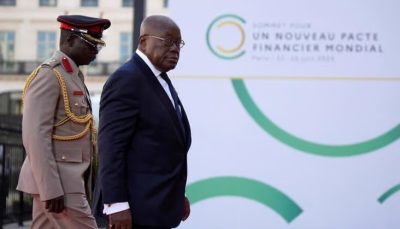Ghana plays for time on debt restructuring as bondholders demand value recovery

Ghana risks long-term damage to its credibility as a borrower as the progress of restructuring discussions with foreign bondholders shows a government determined to play for time.
Bloomberg News reported on 6 March that offshore bondholders want interest payments on some of the country’s debt linked to future economic growth under a ‘value recovery mechanism’, a suggestion that the government has so far resisted. That sets the stage for a prolonged stand-off with bondholders, says James Dzansi, an economist at the International Growth Centre in Accra.
A sovereign debt value recovery mechanism is analogous to the kind of debt-for-equity swap often proposed to lenders to companies who have run into debt distress. It is “standard practice” among bondholders who want to get paid if a country’s economic upside turns out better than expected, Dzansi says. The government “knew this was coming” and “will drag it out for as long as they can,” he argues. “Creditors need to be aware of government incentives.”
A range of short- and long-term incentives on both sides will dictate the outcome. Ghana’s default means that foreign bondholders aren’t getting paid, so in the short term, time is on the government’s side. The government’s hand has been strengthened by the release by the International Monetary Fund in January of a further payment of $600m under its economy recovery programme.
That advantage, however, has a limited shelf-life. Ghana is set for presidential elections in December, and no government wants to leave office with an unfinished debt restructuring left behind. That would create a permanent political stick with which to beat the previous administration.
Ghana must also at some point restore access to international capital markets. So the government “needs to show goodwill during the process,” or face the risk of a long-term lock-out, Dzansi says.
Tax leakages
Ghana defaulted in December 2022, with total debt at 88% of GDP and nearly half of the 2022 budget spent on interest payments. The country reached an agreement with official creditors in January, but a deal with external private bondholders has yet to be reached.
Former Finance minister Ken Ofori-Atta, who was replaced with Mohammed Amin Adam in February, had aimed to agree with bondholders by the end of March. Without the inclusion of a value recovery instrument, Ghana is set to face “a challenging conversation” with bondholders, with a conclusion likely to be delayed until the third quarter, according to a note from BancTrust & Co.
Dzansi is “very confident” that an agreement will be reached before December, as bondholders know that negotiating with an incoming government would add further months of delay. But the agreement in itself won’t be enough to put Ghana’s public finances on a sustainable footing. Better control of expenditure in the first half of 2023 was largely due to the suspension of foreign debt service payments, along with reduced capital expenditure which will compromise long-term growth, according to the Institute for Fiscal Studies (IFS) in Accra.
Ghana’s 2023 mid-year revised budget estimates show the revenue-to-GDP ratio stagnating at 15.8%. That, according to the IFS, is 4.7 percentage points lower than the African average. The government will need to reign in expenditure, and revenue mobilisation will have to improve, Dzansi says. Leakages that reduce the tax take, and tax exemptions for companies, need to be reduced, he adds. (The Africa Report)

